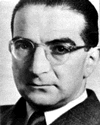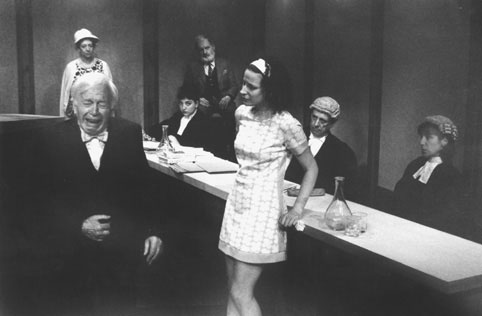Co-editors: Seán Mac Mathúna • John Heathcote
Consulting editor: Themistocles Hoetis
Field Correspondent: Allen Hougland
Rudolf
Kasztner A
Damnable Shame: Perdition Review by David
Jays THE
KASTNER TRIAL - shown at the Jewish Film Festival in
1997 Shamash:
The
Jewish Internet Consortium: Holocaust Home
Page Hitler's invasion of Hungary in
March 1944 was the trigger for the greatest single massacre
in history. In less than two months, between 15 May and 8
July, more than half of Hungary's 800,000 Jews were
deported. Of the 437,000 deportees only 20,000 survived.
Most were murdered immediately after they arrived at
Auschwitz, where the Nazis installed special makeshift sheds
to gas their victims. In all, nearly 600,000 Hungarian Jews
were killed before the Russian liberation of Budapest in
February 1945. The architect of this slaughter
was Adolf Eichmann, who years later provided the Israeli
secret service with their proudest moment when they captured
him in Argentina and brought him back for trial and
execution. But Hungary has haunted Jews and the Israeli
state because it also raised fundamental questions about the
behaviour of the leadership--the Jewish Council in Budapest,
which cooperated with the Nazis, and the international
Zionist leadership which remained silent when it had
detailed information about what was happening at
Auschwitz. For the fact is that it was
only possible for the Nazis to put their plans into effect
so quickly and without resistance because the vast majority
of Hungarian Jews were kept in ignorance. The efforts of the
Jewish Council were devoted to bribing the Nazis to let a
select few escape to Israel. To achieve that, they were
forced not merely to cooperate with Eichmann but in effect
to collaborate with the Nazis in preventing the community
from knowing their fate. It is the behaviour of the
Jewish leadership that is the theme of Jim Allen's play
Perdition, recently revived at the Gate Theatre in London 12
years after its first showing. In 1987 the play was
subjected to an orchestrated campaign of abuse, with leading
Zionists denouncing Allen (and his supporters) as
anti-Semitic. The pressure forced the Royal Court Theatre to
cancel the play, which eventually had its first and only
performance at the Conway Hall. Twelve years later the
protests have been much more muted, a few letters and a
fairly polite lobby by the Union of Jewish Students outside
the theatre--perhaps a reflection of the fact that many Jews
have become more critical of Zionism and its
record. As the play demonstrates,
Zionism as a political philosophy is based on the notion
that anti-Semitism is inevitable. The reaction of the
founder of Zionism, Theodor Herzi, to the witch hunt of
Captain Dreyfus in France was that he 'recognised the
emptiness and futility of trying to combat anti-Semitism'.
Chaim Weizmann, who was in charge of selecting which German
Jews should be allowed to emigrate to Palestine and was
later to become Israel's first president, argued repeatedly
that when it came to a choice between establishing a Jewish
national state and the rescue of the Jews from the Nazis
then the Zionist state came first. Allen's play argues that it was
this approach which typified the Hungarian Jewish
leadership, most notably Rudolf Kastner, who was in charge
of organising the trainload of 1,684 Jews which Eichmann
allowed out in the summer of 1944. After the war Kastner
became a prominent figure in Israel, but then found himself
involved in a libel case in 1955 which rocked the state to
its foundations, when a fellow Hungarian emigrant accused
him of collaboration with the Nazis. The play is set in a
London courtroom, with the Kastner character (Miklos Yaron
in the play) forced to defend himself against the accusation
of collaboration, which in this case comes not from a fellow
Hungarian but from a young Israeli woman who has discovered
the evidence of his behaviour. Allen's play is powerful and
deserves to be widely shown. The script has undergone some
modification in its latest version, which recognises quite
rightly that many Zionists did fight the Nazis, despite the
rotten ideology of their leaders. The new version also
provides more scope for Yaron/Kastner to justify his
behaviour. In the real trial in Israel in 1955 the judge in
effect found Kastner 'guilty'--three of the four accusations
of collaboration were found to be true. The Israeli
government, which had pursued the libel case on Kastner's
behalf, then appealed to the Supreme Court, which in 1957
overturned the earlier ruling on legal rather than factual
grounds--but also called for a public inquiry. Before the
Supreme Court hearing took place Kastner was shot dead by
gunmen who turned out to be former employees of the Israeli
secret service. The secret service had been tipped off about
the murder but took no action to avert it. So the truth of how the
Hungarian Jews were betrayed by their leaders never came
out. Allen's play links their fate entirely to the Zionist
project. It is a persuasive argument but it is not the whole
story. The tragedy of the Jewish resistance to the Nazis in
Eastern Europe is that the backward looking traditions of
community separatism, the ghetto, were deliberately
exploited by the Nazis. Eichmann himself had made a careful
study of the Jews and of Zionist ideology. As one of the
leaders of Hungary's orthodox Jews, Philip Freudiger, wrote
later, 'We should never have allowed ourselves to be herded
into the ghetto.' Yet for the orthodox Jews just as for the
Zionists the ghetto appeared to be a haven. For the orthodox
Jews from the villages it seemed to make sense: their whole
way of life was that of a tightly knit community--the
shtetl. The culpability of the Zionists is that from the
start they fought against the integration and assimilation
of Jews into wider society all in the name of a homeland
which today has many of the characteristics of a ghetto--a
rich, protected and heavily armed ghetto, but a ghetto
nonetheless.

"Chaim
Weizmann, who was in charge of selecting which German
Jews should be allowed to emigrate to Palestine and was
later to become Israel's first president, argued
repeatedly that when it came to a choice between
establishing a Jewish national state and the rescue of
the Jews from the Nazis then the Zionist state came
first." Dave
Shonfield

Perdition:
Top (left): Joyce Springer; Top
(right): Alfred Hofman; Bottom
(left): Morris Perry; Bottom
(middle): Osnat Schmool.
Barristers, from left to right: Rebecca
Gethings, Ian Flintoff
and Penny Bunton. Picture ©
The Gate Theatre, 1999
From Issue 232 of
SOCIALIST
REVIEW Published
July/August 1999
© Socialist
Review